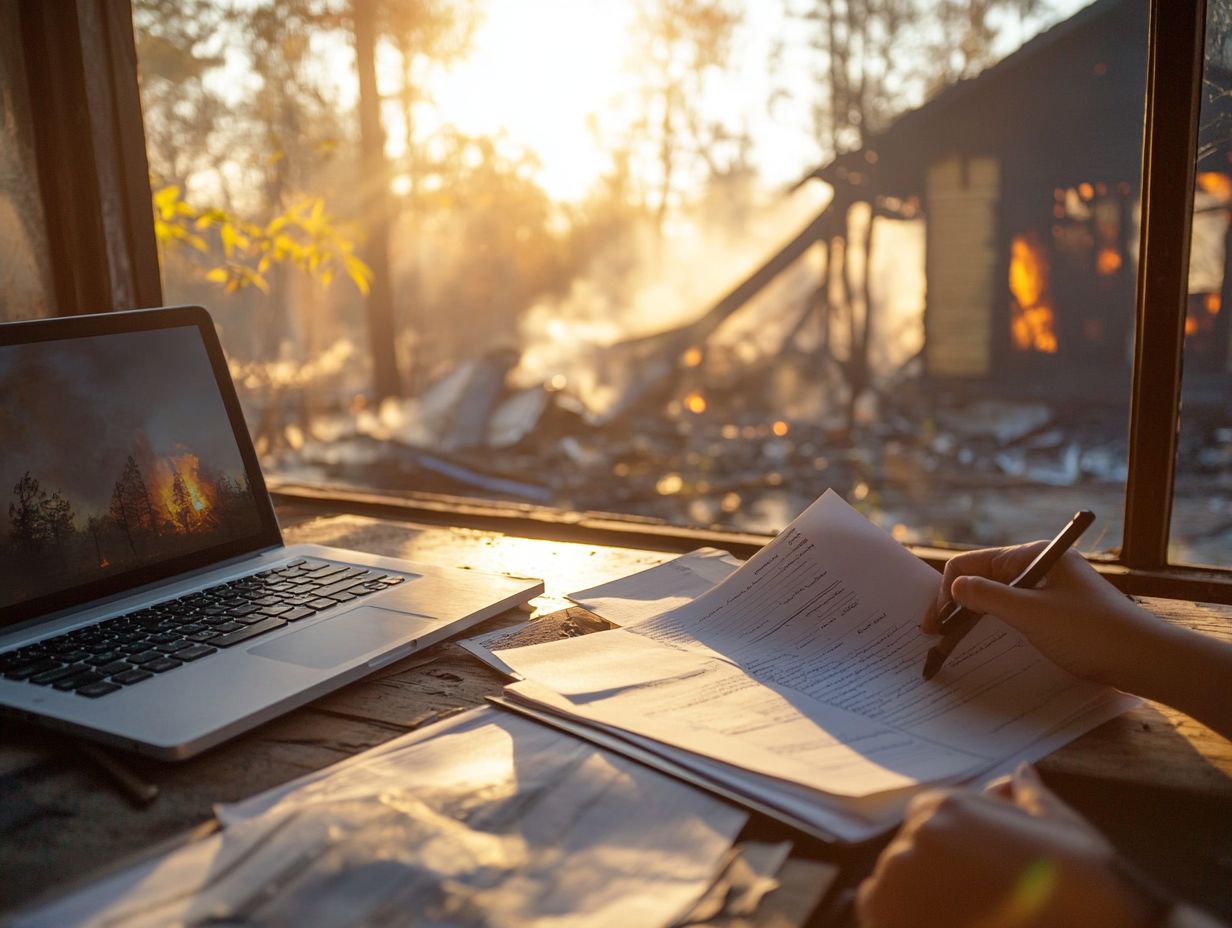How to File a Claim for Fire Damage?
Experiencing fire damage is devastating and can leave you feeling overwhelmed and uncertain. Understanding fire damage claims is crucial to navigating the recovery process.
This article breaks down what your insurance typically covers and guides you step-by-step in filing a claim. You ll learn how to gather essential documents, communicate with insurance adjusters, and ensure quality repairs.
You will also find tips to speed up your claim process, helping you regain peace of mind as you move forward.
Contents
- Key Takeaways:
- Understanding Fire Damage Claims
- Steps to Filing a Fire Damage Claim
- Working with Insurance Adjusters
- Dealing with Fire Damage Repairs
- Tips for a Smooth Fire Damage Claim Process
- Frequently Asked Questions
- What steps should I take after experiencing fire damage?
- What information do I need to file a claim for fire damage?
- Do I need to hire a professional to assess the fire damage?
- How long do I have to file a claim for fire damage?
- Will my insurance cover all the costs of fire damage?
- What should I do if my claim for fire damage is denied?
Key Takeaways:

- Understand what your insurance covers when filing a fire damage claim.
- Notify your insurance company promptly and gather evidence to support your claim.
- Work with adjusters to negotiate and settle the claim, hiring reputable contractors for quality repairs.
Understanding Fire Damage Claims
For homeowners in Texas, understanding fire damage claims is essential. The right fire insurance policy greatly influences your recovery after such an incident.
When facing fire damage, grasping the claims process is crucial. Document the damages, notify your insurance company, and learn how to file a home insurance claim to understand the coverage options available.
By engaging effectively with adjusters and following proper procedures, you can ensure a smooth claims process. This allows for timely reimbursements for damages, living expenses, and necessary repairs.
What is Covered by Insurance?
Fire insurance policies protect you from various fire damage types. They cover the structural integrity of your home and your personal property within it.
It s crucial to understand each coverage type: Coverage A for your home, Coverage B for other structures, and Coverage C for your belongings. This knowledge ensures you’re protected against financial loss.
Also, don t overlook Coverage D, which covers additional living expenses if your home becomes uninhabitable. Review these options carefully to assess your risk exposure fire-related costs can be significant and unexpected.
Common claims arise from kitchen fires or electrical malfunctions, highlighting how quickly destruction can occur. Liability coverage is also important as it protects you against claims from guests injured in fire-related incidents.
This emphasizes the need for comprehensive protection that goes beyond just your physical assets.
Steps to Filing a Fire Damage Claim
Filing a fire damage claim requires a detailed approach for success. Start by documenting the damage thoroughly, capturing detailed photos, and making a comprehensive list of all affected items, while also familiarizing yourself with the claims process for fire damage.
Next, promptly notify your insurance company. Timely reporting is often a policy requirement.
Familiarize yourself with the claims process. Knowing what information adjusters require can influence your claim s outcome significantly.
Gathering Evidence and Documentation
Gathering evidence is essential in the fire damage claim process. To further enhance your understanding, you can also refer to the claims process for home damage from storms. Collect photos of the damage, repair receipts, and any notices from the fire department.
Don t overlook hidden damage; thorough evidence helps adjusters assess the full extent of the damages.
To prepare for filing, compile a detailed inventory of lost or damaged personal belongings, including their estimated values. It’s also important to understand how to report damage to your insurance provider and keep records of any temporary accommodations or additional living expenses incurred due to the fire.
Understand what adjusters look for, such as the fire’s cause and the extent of the damage. This knowledge helps you present your case more effectively.
Being organized can impact the outcome of your claim. Meticulous documentation not only verifies your claims but also shows your commitment to recovering from the incident.
Notifying Your Insurance Company

Notify your insurance company right after a fire incident. Quick reporting kick-starts the claims process and keeps your coverage valid.
When you contact the insurance company, provide a clear account of the damages and expenses, like board-up services or emergency living costs.
Document all communications with the insurance company. Keep records of calls, emails, and letters including dates and times for potential disputes.
Understanding your policy regarding notification deadlines and adjuster assignments can significantly influence the claims process. Each insurer may have different requirements, so be informed for a smoother experience.
Working with Insurance Adjusters
Working with insurance adjusters is a key step in your claims process. They assess the damage and determine how much you can be reimbursed.
Effective communication ensures every part of your claim is considered, from structural damage to personal belongings affected by the fire.
By mastering negotiation and providing necessary documentation, you can enhance your chances of a favorable outcome for recovering expenses related to the fire damage.
Negotiating Your Claim
Negotiating a fire damage claim can be complex. Review the adjuster’s assessment against your coverage and actual expenses closely.
Discuss any discrepancies with the adjuster to ensure a fair settlement. Know your policy limits and the specifics of your damages.
Clear communication with adjusters is vital. You should feel empowered to ask questions about any unclear terms.
Document all interactions and developments. Prepare detailed records of expenses, receipts, and any relevant photographs to bolster your case.
By clearly articulating your needs and staying organized, you can advocate for yourself effectively and work toward a satisfactory resolution.
Dealing with Fire Damage Repairs
Getting your property back to a safe and livable condition is essential after a fire! Navigating repairs is a crucial step in your recovery journey.
Selecting qualified contractors and obtaining comprehensive estimates should align with the reimbursement process from your insurance claims.
Keep detailed records of all repairs and related expenses. This supports your claims and ensures you receive full coverage under your policy.
Hiring Contractors and Getting Estimates
Hiring reputable contractors and obtaining accurate estimates is crucial for effectively addressing fire damage repairs. Conduct thorough research to find qualified professionals specializing in fire damage restoration.
Look for contractors with relevant certifications and positive reviews from previous clients; these indicators can offer peace of mind.
When gathering estimates, ensure they include an itemized list of services, allowing for clear comparisons. Engaging different specialists helps evaluate pricing and provides insight into their communication styles and expertise.
Understanding your insurance coverage can influence overall repair costs, so review your policy details before the hiring process.
This proactive approach will contribute to a smoother and more efficient restoration experience for you.
Ensuring Quality Repairs

Ensuring quality repairs after fire damage is crucial for homeowners. This process allows you to effectively restore your property and prevent future issues.
Conduct inspections during and after the repair process to verify that the work meets the necessary standards and adheres to local building codes.
Maintain clear documentation of all repairs and inspections. This ensures your insurance coverage is applied correctly and supports any future claims.
Engaging a certified contractor who specializes in fire damage repairs can significantly enhance the quality of the work performed. Be proactive in seeking references and reviews to assess past customer satisfaction.
Schedule regular check-ins throughout the repair timeline to address any concerns as they arise. Familiarize yourself with your insurance policy details; understanding all requirements helps prevent delays in claims processing and disagreements with your insurer.
Tips for a Smooth Fire Damage Claim Process
Navigating the fire damage claims process can feel daunting. By following the best practices for filing a home insurance claim, you can streamline the experience and minimize potential setbacks.
Keep meticulous documentation of all interactions and expenses; this detail is your ally. Promptly notify your insurance company after an incident timeliness is crucial.
Fully understanding the specifics of your policy, including coverage details and the claims process, empowers you to engage confidently with insurance representatives and advocate effectively for your needs during recovery.
Keeping Detailed Records
Keeping meticulous records throughout the fire damage claims process is crucial for policyholders. This practice ensures you have all necessary documentation to support your claims.
Maintain logs of your communications with the insurance company and adjusters. Don t forget to keep receipts for any expenses related to temporary living arrangements, repairs, and mitigation efforts.
Organize photographs of the damage and create a comprehensive inventory of lost or damaged possessions. Categorizing your records by type such as damages, expenses, and communications using digital folders or physical binders enhances clarity.
This organized approach improves your communication with claims representatives and speeds up the claims review process, as all necessary information is readily accessible when needed.
Ultimately, thorough documentation leads to a smoother experience, ensuring you feel prepared and informed at every step of your claims journey.
Understanding Your Policy
Understanding your insurance policy is crucial for navigating the fire damage claims process with confidence. Additionally, familiarizing yourself with the claims process for natural disaster damage can be beneficial. Review your policy documents to grasp the extent of your coverage, paying close attention to specifics related to fire damage, liability, and personal property.
Familiarity with these details allows you to pinpoint relevant clauses, enabling precise claims. Beyond knowing your coverage limits, check for exclusions that delineate situations outside your policy s protection.
These could include specific types of damage or certain events your insurer does not cover. Also, check for conditions that must be met for your claims to be valid, such as regular maintenance requirements or timely notification of damage.
Take a proactive stance highlight key sections and use a checklist when reviewing your documents. This way, you can ensure a comprehensive understanding of your rights and responsibilities throughout the claims process.
Frequently Asked Questions
What steps should I take after experiencing fire damage?

After experiencing fire damage, the first step is to ensure the safety of yourself and other occupants. Once everyone is safe, contact your insurance company to notify them of the damage and learn how to file a home insurance claim successfully to begin the claim process.
What information do I need to file a claim for fire damage?
To file a claim for fire damage, gather your insurance policy number, a detailed description of the damage, and any photos or videos. If you also need information on water damage, be sure to check how to file a claim for water damage. Additionally, make an itemized list of possessions lost or damaged in the fire.
Do I need to hire a professional to assess the fire damage?
Hiring a professional to assess fire damage is a smart choice. They provide an accurate report, which is crucial for your claim. Your insurance company may also need this assessment before processing your claim.
How long do I have to file a claim for fire damage?
Each insurance company has its own deadline to file a claim. Check your insurance policy or contact your insurer to find out your specific timeframe.
Will my insurance cover all the costs of fire damage?
This depends on your insurance policy and the details of the fire. It’s important to know how to handle home insurance after a disaster by reviewing your policy to understand what is covered before filing your claim.
What should I do if my claim for fire damage is denied?
If your claim is denied, contact your insurer to discuss the reasons. You may want to hire a professional who helps negotiate with the insurance company or seek legal advice.
Keep detailed records during the claims process to support your case.





